
It's been a month since Michelle Yeoh won the Best Actress Oscar for her work in awards juggernaut Everything Everywhere All At Once. As one of the folks who believed she deserved that honor above Blanchett's much-lauded sTÁR turn, the moment was joyous beyond its undeniable value as a representation triumph. And yet, even watching the thespian's clear emotion when accepting the statuette, the full context of the win eluded me. Prior to this victory, Yeoh was a familiar face from various Hollywood projects and, of course, the masterpiece that is Crouching Tiger, Hidden Dragon. However, to my great shame, her Hong Kong action career remained undiscovered.
Taking cues from the Criterion Channel's "Michelle Yeoh Kicks Ass" collection, I celebrated the one-month anniversary of her historical Oscar win by getting to know another side of our reigning Best Actress champion. It was an eye-opening experience…
Michelle Yeoh didn't start out wanting to become a movie star. Indeed, the Malayan-born future Oscar-winner studied ballet in London at the Royal Academy of Dance during her teen years. Sadly, a spinal injury derailed her plans, making a professional career in ballet next to impossible. So instead, Yeoh dedicated herself to other artistic endeavors and, in 1983, was crowned Miss Malaysia World. She placed eighteenth when competing at the Miss World pageant, later finding work in commercials. Her first such job found her partnering with Jackie Chan to promote Guy Laroche watches.
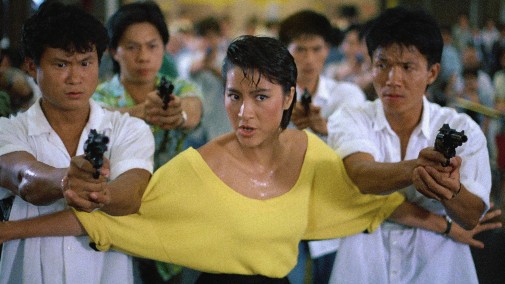
During these early outings in front of the camera, Yeoh started to learn how to speak Cantonese, a crucial skill for working in the Hong Kong movie business. Another vital piece of expertise was the ability to pick up choreography quickly. That's how a novice actress with no formal training in martial arts became an overnight sensation as an action movie star. Her big screen debut was in 1984, and just one year later, she was already headlining Yes, Madam alongside Cynthia Rothrock. Schlocky, silly, and dated as fuck, the picture won't be to everyone's tastes, but it's hard to deny Yeoh's charisma or the balletic quality of her movement in the climatic set piece.
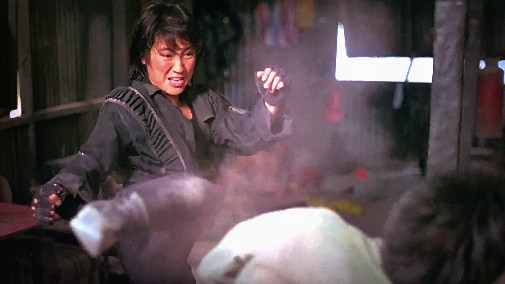
Still, you'd be excused for thinking Michelle Yeoh, then credited as Michelle Kahn, was a fearless stunt woman with little to offer as an actress. Such pithy assumptions become hard to sustain once you see her next movie, David Chung's Royal Warriors. Sure enough, it all starts with a no-nonsense 'by the rulebook' cop in the vein of her character in Yes, Madam. However, the fight scenes are more constant and varied, allowing for gradations of aggression, different levels of ease. And later, as the story's violence makes fun curdle into tragedy, she's asked to deliver darker shades, the nuance of a vengeful spirit born out of sorrow, the agonized recklessness of one who's got nothing left to lose.
There's space for comedy, too, the rebuke of romance inciting many laughs. That could also work at a meta-level since, as you'll notice, Yeoh's early films seldom portrayed her as a sexual creature or a woman in pursuit of love. Instead, competence was at the forefront, making for a screen persona defined in terms of strength. While limiting, this also allowed Yeoh to explore dynamics often unavailable to Hollywood leading ladies. For example, in David Chung's 1987 Magnificent Warriors – entirely unrelated to the previous movie – Michelle Yeoh is akin to a Hong Kong Harrison Ford. She's a secret agent in 1930s Tibet, putting on a rogue Han Solo-like façade while she defeats Japanese bad guys through a mix of martial arts and Indiana Jones whip tricks.
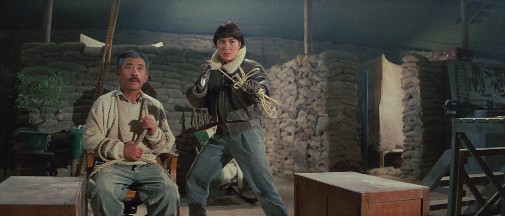
Though the action period piece is suffused in Chinese nationalism, it's beautifully made, anchored by Yeoh in one of her last star turns before temporary retirement from acting. In the same year Magnificent Warriors arrived in theaters, she wedded Dickson Poon, head of the D&B Group whose movies made her famous. The marriage wouldn't last, and with divorce came a return to the silver screen. In 1992, she'd reunite with Jackie Chan in his third Police Story movie, the first he didn't direct. That detail is crucial since director Stanley Tong allowed Yeoh to be an effective co-lead, promoting a sense of competition that underlines every insane stunt.
![]()
Perfectly structured, Police Story 3: Supercop is a showcase for Yeoh the maverick, and Yeoh the straight-laced comedienne. Not that the shooting was easy, as you can confirm by the credits, which feature outtakes of the failed stunts in Hong Kong action movie tradition. In one instance, you can even see what the actress has described as one of her most dangerous accidents when a windshield didn't shatter as it was supposed. She slipped from the front of the moving car, falling onto the road, her head inches away from a crushing tire. Thankfully, no significant injury occurred. In the future, Michelle Yeoh wouldn't be as lucky.
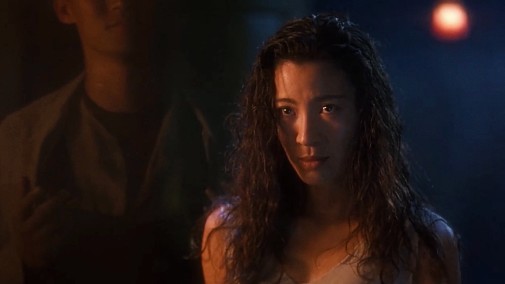
Before we get to that misfortune, it's time to talk about a pair of gonzo superhero movies – Johnnie To's The Heroic Trio and its immediate sequel, Executioners. Stylized to the nth degree, the movies are a dream of bright colors and fantastic gore, cartoony but unashamed about it. Making no apologies for its lunacy, The Heroic Trio is particularly brilliant, balancing itself through the three heroines played by a maternal Anita Mui, brash Maggie Cheung, and Michelle Yeoh as the most serious and conflicted of the three. She also gets to embody a romantic tragedy for once, showing a new facet for the camera while looking great in sexy superhero drag. Though hardly the MVP of either flick, Yeoh is integral to their brilliance.
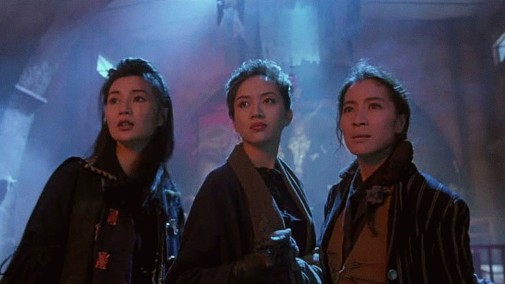
Career revitalized, Yeoh spent the rest of the 90s solidifying her star, later making her way to Hollywood via the James Bond franchise. Before that, however, she delivered one of her best performances in a film whose reflections on real-life started uncomfortably and became nightmarish. The Stunt Woman is Ann Hui's homage to the efforts of stunt people, detailing years in the life of Ah Kam, who starts the movie as an inexperienced transplant from Mainland China making her way in the Hong Kong industry. After being selected at random by Master Tung, she becomes a regular player in the stunt director's team.
Though they often feel like a makeshift family, the troupe of performers isn't perfect, with rivalries endangering lives and outside influence upping the risk factor. Injuries are customary, and even when she gets to direct, Ah Kam feels pressure to orchestrate dare-devilling feats. For a while, it's a treat to watch Yeoh work within a naturalistic register while showing off her athleticism, wires visible as we peek behind the scenes. Still, a bad romance deters the character from the stunt woman life. Then everything goes wrong, and returning to the movie business feels logical, like a way to re-center herself. Only the plot abandons everything to be a Triad thriller in the last 30 minutes.
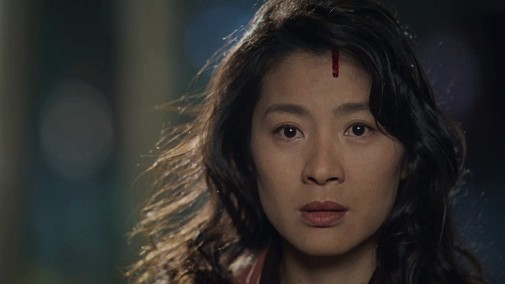
It's incredible to watch Yeoh project the growing confidence of a professional finding their footing, then a woman negotiating the frustrations, disappointments, the traumas of a relationship leaning toward abuse. At last, the actress gets to play mother-like instincts, The Client for a Hong Kong crowd, finishing with a TÁR-like closeup in front of the TV screen. As the end credits roll, you discover the reason behind the movie's disjointed nature. It's the outtakes tradition again, only more horrifying this time around. When performing her character's first stunt after retirement, Yeoh suffered an accident that resulted in a grievous spinal injury.
The ordeal broke the movie, forcing Ann Hui to come up with a new script and scaring her away from ever trying her hand at action again. Ever the trooper, Yeoh powered through and completed the shoot even though she couldn't perform any more stunts. The result is a strange film whose dysfunction is like the greatest testament to the dangers of stunt work, the reckless artistry, the brilliance of Yeoh as a dramatic actress and action star. Such talents would be made evident again when, in 2000, she starred in Ang Lee's modern wuxia classic Crouching Tiger, Hidden Dragon. This time, however, the entire world woke up to the glory of Michelle Yeoh, not just Chinese audiences.
An international commercial and critical hit, the production involved another horrible injury, but Lee had the leeway to pause and alter production, waiting for his star's recovery. As a result, some scenes had to be shot with a leg immobile, elevated in ways that make Yeoh's heartbreaking characterization all the more impressive. Whether selling a fight scene with Zhang Ziyi so it hits harder than any monologue ever could or cradling Chow-Yun Fat's face as a warrior watches her love die, it's an awards-worthy performance through and through. She came close, nabbing a well-deserved BAFTA nomination and legions of new fans.
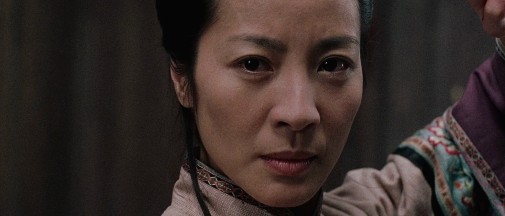
Coming back to her Oscar victory after that marathon, it gains new power. I didn't cry the first time, but when re-watching the moment on Youtube, I suddenly felt tears pooling over my eyes. It's ridiculous to get so emotional over this, but I never said I wasn't a ridiculous man. Action movie acting rarely gets its due, so often delegitimized as something that's more sports technique than dramatic prowess. But oh, when you see Yeoh in her element when you experience the cumulative breath of her work in Hong Kong cinema, how can you dismiss her talents? She's a vision, a revelation. Michelle Yeoh is an ass-kicking action star for the ages, and don't you dare forget it.
Have you seen the titles in Michelle Yeoh Criterion Channel collection? If so, what's your favorite?